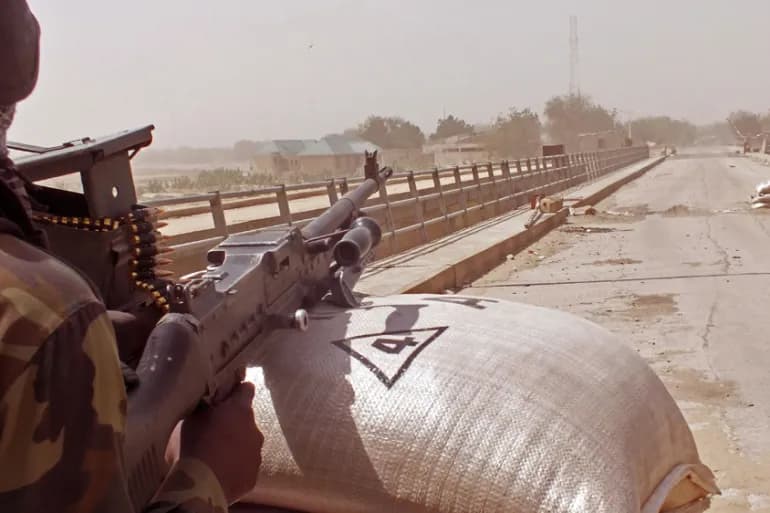YAOUNDÉ, Cameroon – Cameroon is continuing to be attacked by the Islamist organization Boko Haram, and the situation is getting worse, according to a bishop.
Bishop Barthélemy Yaouda Hourgo of the Yagoua Diocese in Cameroon’s Far North region, Barthélemy Yaouda Hourgo spoke to Crux about the deteriorating security situation in the area during the 50th Ordinary Plenary Assembly of the Cameroon Bishops’ Conference.
“The current situation of insecurity is worsening,” he said. “I say this because just recently, soldiers were killed only 5 kilometers from my village.”
On March 25, Boko Haram fighters, disguised as herdsmen, launched a deadly assault on a military base in Wulgo, near the Nigerian border. The base, operated by Cameroonian soldiers from the Multinational Joint Task Force, was overrun by the assailants, resulting in the loss of at least 20 soldiers.
According to sources cited by the French news channel Africa 24, the insurgents seized Soviet-made Shilka guns — lightly armored, radar-guided anti-aircraft weapons further escalating the threat.
Yaouda Hourgo expressed concern over the worsening security situation, emphasizing that the terrorist organization is increasingly acquiring sophisticated weaponry.
“Boko Haram now has access to drones,” the bishop told Crux.
“Unfortunately, we are losing soldiers, and the toll on civilians is even more devastating. Civilians who have their cattle in the bush are killed. It’s become part of our daily lives,” he said.
Added to the attacks are the kidnapping of people for ransom.
“Once kidnappers believe you have a little money, they will either come for you, your kids or your wife. They take all these people and they can only be released upon the payment of a ransom,” Yaouda Hourgo explained.
Boko Haram, an extremist group that emerged in Nigeria in 2009, when it launched a violent campaign with the goal of establishing a caliphate across the Sahel.
Initially operating within Nigeria, the group soon expanded its attacks to neighboring countries — Cameroon, Chad, and Niger — causing widespread devastation. According to the United Nations, Boko Haram has killed at least 40,000 people and displaced more than 2.3 million, leaving countless families in turmoil.
Its activities have severely disrupted livelihoods across the Lake Chad Basin, an area that sustains nearly 40 million people through fishing, farming, and herding. Communities that once relied on these industries now face economic instability, food insecurity, and a continuous threat of violence.
The group’s name, Boko Haram, translates to “Western education is prohibited,” and its radical ideology has led to the closure of many schools across Cameroon and the broader Sahel region.
However, while Boko Haram’s attacks have directly contributed to the decline of education in Cameroon’s Far North, the crisis has been exacerbated by a government that has failed to invest adequately in the region’s children. A lack of resources, infrastructure, and support has left many young people without access to quality education, further deepening the challenges faced by the area.
This reality is not lost to the Bishop of Yagoua.
“I feel deep sadness that the Far North region is always left behind,” Yaouda Hourgo said.
“When I see the disparity in resources — how our children don’t receive the same opportunities as those in Yaoundé, Douala, or Bafoussam — it’s disheartening. If given the same means, they could thrive because there are incredibly intelligent people here,” he said.
“We are not ignorant; in fact, I assure you that the Far North is home to exceptionally bright students. Very, very intelligent young minds. Yet, we face overwhelming challenges. Schools often lack basic necessities — benches, classrooms, even roofs. Imagine a child studying in unbearable conditions. Just last week, I was in Kousséri for a pastoral visit. I met students in a room with a scorching 46-degree [114ºF] temperature. Picture a child trying to learn in a school with no roof. How can they possibly be expected to compete academically with students in better-equipped regions?” Yaouda Hourgo added.
He said both insecurity and poverty have affected the Church in more ways than one and expressed worry that with the dearth of western funding, only faith could keep the Church going in that part of the country.
“The Church is also facing difficult times,” he said.
“For years, Europe has been our primary source of support, but now, it has little to offer. First, there are fewer Christians. Churches are empty, offerings have dwindled, and requests for Mass have declined. Financial aid has virtually disappeared,” he told Crux.
He said that at the level of the Episcopal Conference, there are discussions on how the Church can survive without external support.
“We are searching for ways to sustain ourselves, but independence requires support,” said Yaouda Hourgo.
“If you want to establish a bakery, you need funds to get it started. If you want to engage in farming—something we in the North could certainly do—you still face challenges. In one night, hundreds of sheep could be stolen, jeopardizing the effort,” he admitted.
“Despite these hardships, the Church does not belong to an individual — it belongs to God. That is why it has endured for 2,000 years,” he said.
“Priests and bishops do not receive salaries, yet they continue to live. The financial survival of the clergy depends on the generosity of Christians. It is thanks to you, and to others, that we are able to carry on,” Yaouda Hourgo said with a smile.














